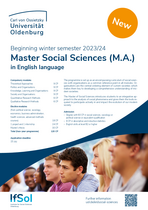Master Social Sciences
The "Social Sciences" Master's programme has a broad social science profile, where the key theme of “organisations” is developed across all modules. Organisations are central to modern societies and are present throughout our lives in the areas of education, health, culture, politics and economics. Accordingly, detailed knowledge about the workings of organisations is essential for developing a comprehensive understanding of modern societies. With its unique emphasis on organisations in the German-speaking academic landscape, the M.A. “Social Sciences” provides students with in-depth and consistent knowledge in both political science and sociology.
In our modern society, and in the social sciences in particular, dealing with knowledge construction and social practice is vital to understand how our world works. Here in Oldenburg, the M.A. "Social Sciences" offers opportunities for students to specialise in areas of their own choosing and aims to introduce students to an integrative approach to the analysis of social phenomena. Graduates will be given the tools required to actively participate in and impact the evolution of our modern society.
By using English as the language of instruction, students are able to develop their intercultural skills and become better equipped for navigating a multicultural environment. These abilities ensure that graduates are competitive in both the business world and academia.
Focus areas
Social scientists must have the ability to think through scientific or practical problems from different perspectives. They should be able to situate these problems in a wider context and research them using appropriate approaches and methods. Accordingly, the M.A. "Social Sciences" curriculum is structured to combine subject-specific and practical research skills with comprehensive theoretical knowledge and a wide range of methodological approaches. The programme equips students with the tools to theoretically analyse the social science issues inherent in an organisational society and to empirically investigate them via quantitative and qualitative methods. In doing so, students are able to critically unpack the ‘norms’ and persistent systems of our modern society.
The curriculum consists of compulsory modules focusing on the theoretical foundations of organisational research, organisations in politics and society, and knowledge and learning in organisations, as well as providing a comprehensive understanding of qualitative and quantitative methods. Students can customise their course by selecting from a wide range of electives in political science and sociology, economics, business administration, health sciences, and advanced methods courses.
Access regulation
Admission to the Master Social Science programme is governed by the admission regulations which can be downloaded here. The admission requirements are set out in §2 in particular:
- Completion of a relevant Bachelor's degree programme or an equivalent qualification;
- a previous course of study is considered subject-relevant if the degree programme leading to a Bachelor's degree or an equivalent degree has provided competencies in one of the areas of social sciences, sociology, and/or political sciences with a minimum of 60 credit points,
- descriptive and inductive statistical skills, knowledge of data management and data analysis using common statistical software and introductory knowledge of linear regression analysis including its assumptions amounting to at least 9 credit points have been acquired;
- Sufficient knowledge of the English language at level B2 of the Common European Framework of Reference for Languages (CEFR) must be demonstrated for the programm.
- Applications must be submitted electronically via the online portal of the Carl von Ossietzky University of Oldenburg. The application must be submitted by 30 September. For applicants with a foreign university degree from a third country, the deadline for applications is 31 August.
- The Master's degree programme in Social Sciences begins in the winter semester.
The Admissions Committee is responsible for admissions (Kommissionen und Ausschüsse // Universität Oldenburg (uol.de)).
Language requirements
In order to study this course at the University of Oldenburg as a student from outside of Germany, you need an adequate knowledge of German.
English Language Proficiency see admissions regulations
- Common European Framework of Reference for Languages (CEFR) Level B2 or
- if applicants are native speaker or they have university entrance qualification or a university degree obtained in English (within the last two years)
The proof of language proficiency must be presented for the enrolment. Applicants who need a preparatory German course before commencing their studies must present their knowledge of English with their application. Language skills can also be proven by Abitur certificates showing that English has been completed as a continued foreign language for at least five years with sufficient performance, or by proof of a semester abroad with English as the teaching language; this proof must not be older than 5 years.
Career opportunities
By taking the M.A. "Social Sciences", Graduates will acquire a wide range of skills transferable to a number of career opportunities, including:
- (International) Organisational development and consulting
- Public administration and political organisations
- Media production and development, including e.g. opinion research
- University research and teaching
- Teaching in other education institutions
- Science management at universities or research institutions




